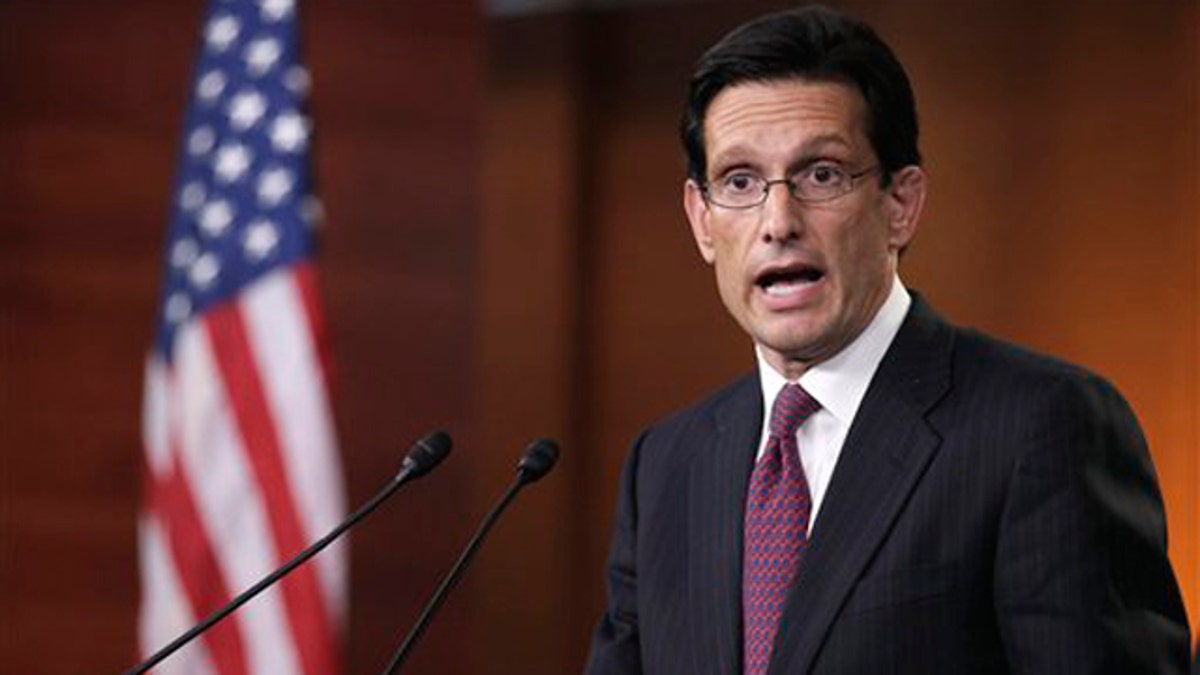
House Majority Leader Eric Cantor gestures during a news conference on Capitol Hill April 7. (AP)
Fresh off winning nearly $40 billion in cuts to the rest of this year's budget, congressional Republicans on Sunday began listing their demands ahead of the next crucial spending fight on Capitol Hill.
Entitlement reform, spending caps, a balanced-budget amendment and an overhaul of the budget process are among the items on that GOP wish list. Having gotten much, though not all, of what they wanted in the last set of marathon negotiations, Republican leaders vowed Sunday to build on their momentum as Congress takes up a budget plan for 2012 and the rest of the decade.
"This budget deal that was cut ... is only the beginning," House Republican Leader Eric Cantor, R-Va., told "Fox News Sunday." "This is the first bite of the apple."
In the last round of negotiations, the threat of a government shutdown was used as a bargaining chip by both sides of the aisle. That threat undoubtedly helped Republicans and Democrats reach an eleventh-hour deal late Friday night -- under the terms, Congress passed a bridge bill keeping the government open through next Thursday and plans to vote on a final fiscal 2011 budget in the coming days.
But in the next round, Republicans made clear that they plan to use the looming vote on whether to raise the debt ceiling as their not-so-secret weapon.
Cantor bluntly called this a "leverage moment." He said that if the White House wants Congress to raise the country's $14.3 trillion debt ceiling, Republicans are going to need to see real changes.
"This is about making the right decisions now," Cantor said. He touted Rep. Paul Ryan's, R-Wis., budget proposal -- a plan released last week that contains about $6 trillion in spending cuts over the next 10 years -- and suggested Republicans would fight for at least a chunk of that plan as a condition of their support on the debt limit vote.
Sen. Jeff Sessions, R-Ala., top Republican on the Senate Budget Committee, told Fox News he's looking for statutory caps on spending, a constitutional amendment calling for a balanced budget and perhaps a new system where budgets are drafted for two years at a time, instead of one. At the least, he said President Obama needs to embark on a bipartisan effort to "rein in" the systemic problems that have the national debt in an upward tailspin.
"If he does not come forward with that, we're not going to pass the debt increase," Sessions said. Democrats, though, have assailed Republicans for exploiting the debt ceiling vote. The Obama administration repeatedly has warned that Congress risks sending the nation into default, while triggering higher interest rates and an erosion of the job market, if it fails to raise the debt limit.
"It could be a formula for recession or worse," Sen. Charles Schumer, D-N.Y., told CBS' "Face the Nation." "So this is playing with fire. And I would urge both sides to take the threat of not renewing the debt ceiling off the table."
Senior White House adviser David Plouffe said Sunday, over the course of several television interviews, that Obama will outline a new plan this week for reducing the deficit, and Schumer described that as a positive step.
But while the White House, with its new plan, is trying to persuade Republicans against freezing the debt ceiling, the two parties are likely to be left with major differences in their approach to spending cuts.
Plouffe predicted Sunday that Ryan's budget plan would not become law.
Rep. Chris Van Hollen, D-Md., on ABC's" This Week" slammed Ryan's budget proposal as an attack on seniors. The Republican proposal would, for those under 55, stop paying doctors directly for senior health care and instead give seniors a subsidy to purchase private insurance from an approved list of plans. Though Ryan claims his proposal saves an otherwise unsustainable entitlement program, estimates show seniors will be left paying more out of pocket.
"It's totally unbalanced," Van Hollen said. "He ends the Medicare guarantee for seniors. ... They'll have to eat all of the rising costs of health care, while they provide big tax breaks for millionaires and the corporate special interest. "
Van Hollen described the GOP's threats regarding the debt ceiling as a "hugely dangerous" game of chicken.
Ryan, in an interview with NBC's "Meet the Press," said the GOP is merely trying to achieve a "clean break" from current fiscal policies.
"Our strategy is not to default. Our strategy is to get spending under control," he said. Though the government just averted a shutdown, Ryan acknowledged that more tense showdowns may be ahead for Congress.
"We want to move from talking about saving billions of dollars to going on and saving trillions of dollars," he said.





















